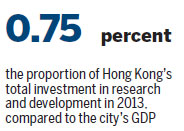HK's competitiveness falls behind most major cities on the mainland
Updated: 2015-06-24 07:56
By Felix Gao in Hong Kong(HK Edition)
|
|||||||||
Hong Kong's comprehensive competitiveness among the country's provincial-level regions fell 5 places to 12th, while Guangdong, Jiangsu and Shandong provinces topped the ranking, results of the China Institute of City Competitiveness' survey show.
The SAR's growth competitiveness ranked only 24th among all 34 provincial-level regions. But it still topped the per capita wealth competitiveness ranking, and was named the most internationally influential city of China.
The institute said Hong Kong's comprehensive competitiveness has been declining in recent years, as the mainland's economy has maintained a robust annual growth rate for many years and the rapidly developing major cities, Shanghai, Beijing and Shenzhen, are challenging the position of Hong Kong.
Hong Kong led the nation's list of the most competitive cities for 12 years in a row until it was surpassed by Shanghai in 2013, according to the institute. In a Chinese Academy of Social Sciences research released this May, Hong Kong lost its top ranking in competitiveness for the first time in 13 years, trumped by its neighbor Shenzhen.
The report noted that Hong Kong has lost its long-term competitive advantage, as its industrial structure is lacking in diversity and it has no real economy. Hong Kong's gross domestic product (GDP) was surpassed by Shanghai and is predicted to be surpassed by Guangzhou and Shenzhen this year, and more mainland cities after 2016.

Hong Kong's insufficient land supply and its monopolized real estate market have led to high property prices. The high cost of living has restricted the development of Hong Kong and undermined its competitiveness, said the report.
The city is also suffering from its lack of innovation while scientific research personnel and research funding are in short supply. Its total investment in research and development in 2013 amounted to HK$15.6 billion, accounting for 0.75 percent of GDP, compared with 2.08 percent on the mainland and 0.98 in Kenya, according to the institute.
Gui Qiangfang, president of the institute, said Hong Kong still has other advantages. "Hong Kong has been ranked as the world's freest economy. The city's simple tax regime, low tax rates, sound legal system, clean government and high quality education are cornerstones of its competitiveness," he said.
Gui suggested that Hong Kong government should set up a study group to draft a strategic plan on long-term competitiveness. He said increasing innovation investment is crucial to the city's future development.
"Hong Kong should learn from the success of Shanghai and Shenzhen. Collaboration with Pearl River Delta cities and other mainland cities is also necessary," said Gui.
Hong Kong can also enhance its competitiveness by actively taking part in mainland's "One Belt, One Road" initiative, he added.
felix@chinadailyhk.com
(HK Edition 06/24/2015 page6)